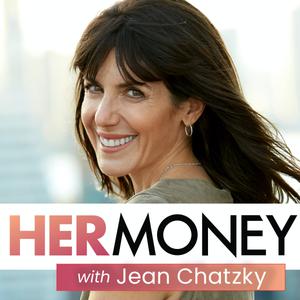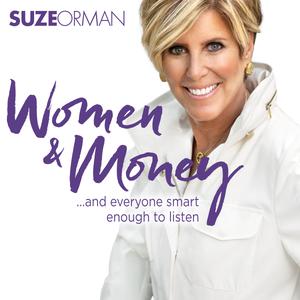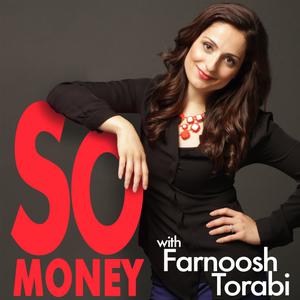
HerMoney with Jean Chatzky
Jean Chatzky Her Money
Personal Finance Expert. Award-Winning Journalist. Best-Selling Author.
- 26 minutes 5 secondsStock Market Predictions for 2025
Today, Jean Chatzky is joined by Karen Finerman, CEO of Metropolitan Capital Advisors, a CNBC Fast Money panelist, and co-founder of our InvestingFixx Club. Together, they reflect on the standout moments of 2024, take a deep dive into the forces shaping the markets in 2025, and offer insights into the year ahead.
Whether you’re new to investing or a seasoned pro, this episode is packed with actionable advice, thoughtful analysis, and inspiration to help you navigate the markets with confidence in 2025.
Learn more about InvestingFixx, our women’s investing club where you can vote on stocks, build a model portfolio, and grow your financial knowledge. Take the next step in your financial journey with FinanceFixx, our money makeover program.
Have a question for us? Write to us (or send us a voice note!) at [email protected].
While you’re at it, join the HerMoney community! For the latest episode drops and financial news-you-can-use, subscribe to our newsletter at Hermoney.com/subscribe!
Learn more about your ad choices. Visit megaphone.fm/adchoices
17 January 2025, 7:00 am - 50 minutes 23 secondsEp 458: Healthy Relationships With Money: A Psychologist Tells All
It’s somehow the middle of January — which means if you’ve made your resolutions and you’re still sticking to them, congratulations are in order! You’ve made it past Quitters Day or the day when most people abandon their resolutions (it falls on the second Friday in January).
But if you have fallen off of your financial resolutions, this is your sign to pick them back up. Because of his year, it’s time to get serious about building some financial stability, financial resiliency, and cultivate a healthier relationship with money.
Matt Lundquist, a Columbia University-trained psychotherapist and founder of Tribeca Therapy digs into the root of our money issues and walks us through the steps we can take to improve our relationships with money once and for all.
CHAPTERS:
00:00 Improving financial habits in the New Year
06:00 Common barriers to good financial behavior
18:00 Why people overspend and use money to address emotional voids
28:00 When to seek financial therapy
33:00 Mailbag Question 1: What’s the best way to invest in Bitcoin with a small amount of money?
40:00 Mailbag Question 2: How do I best support my parents in paying back my student loans?
TAKEAWAYS:
- Many financial behaviors, such as avoiding credit card statements or overspending, are tied to deeper psychological patterns rather than a lack of financial knowledge.
- Tackling small financial disagreements early as a couple can help build a framework for handling larger financial challenges later.
- Finding the right therapist involves looking for someone experienced in discussing money-related emotions or asking targeted questions about their experience with this topic.
Learn more about Jean Chatzky's multiweek Money Makeover program FinanceFixx here. Use code PODCAST for a $100 discount.
Interested in learning more about investing alongside hundreds of other women? Join us every other Monday night on Zoom at investingfixx.com. Your first month is completely free.
Have a question for us? Write to us (or send us a voice note!) at [email protected].
While you’re at it, join the HerMoney community! For the latest episode drops and financial news-you-can-use, subscribe to our newsletter at Hermoney.com/subscribe!
Learn more about your ad choices. Visit megaphone.fm/adchoices
15 January 2025, 9:00 am - 32 minutes 16 secondsHerMoney Classic: The Surprising Link Between Alcohol and Financial Freedom
Today, in honor of #DryJanuary, we’re bringing back this episode with Laura McKowen, author of We Are the Luckiest: The Surprising Magic of a Sober Life.
We explore the evolving conversation around alcohol consumption, sobriety, and how they intersect with women’s lives, careers, and finances. Laura also shares her personal journey with alcohol addiction, recovery, and how sobriety improved her financial habits and overall life.
CHAPTERS:
2:30: Alcohol and Culture: Why We Don’t Talk About It
8:00: A Turning Point: Laura’s Sobriety Journey
17:45: The Financial Cost of Drinking
26:00 Practical Tips for the Sober Curious
Additional Resources:
- “Is That Drink Worth It To You?” By Susan Dominus
- This Naked Mind by Annie Grace
Learn more about Jean Chatzky's multiweek Money Makeover program FinanceFixx here. Use code PODCAST for a $100 discount.
Interested in learning more about investing alongside hundreds of other women? Join us every other Monday night on Zoom at investingfixx.com. Your first month is completely free.
Have a question for us? Write to us (or send us a voice note!) at [email protected].
While you’re at it, join the HerMoney community! For the latest episode drops and financial news-you-can-use, subscribe to our newsletter at Hermoney.com/subscribe!
Learn more about your ad choices. Visit megaphone.fm/adchoices
10 January 2025, 7:00 am - 46 minutes 1 secondEp 457: What You Need To Know About the 2025 Economy
Welcome to 2025! It’s a New Year and it’s also a Presidental transition year which means we’re all wondering where things may be headed this year economy-wise. A little trepidation is always expected anytime a new President is due to take office, but Americans are feeling especially uncertain about how President-elect Trump’s decisions may have a ripple effect on our personal economies.
Kathryn Edwards, PhD Economist shares how the US economy is really doing and what it could mean for our wallets in 2025.
CHAPTERS:
04:00 The lasting economic reverberations from the pandemic
06:00 Structural economic inequality in the U.S.
11:00 The economy’s cyclical nature
14:00 Advice for investors
17:00 The economic impact of tariffs
22:00 The childcare market failure
TAKEAWAYS:
- The pandemic's impact has left a long-lasting imprint, contributing to current economic uncertainty.
- The challenges Americans face are rooted in decades of structural economic inequality dating back to the 1980s.
- Tariffs increase consumer costs and create unpredictable economic ripple effects.
Learn more about Jean Chatzky's multiweek Money Makeover program FinanceFixx here. Use code PODCAST for a $100 discount.
Interested in learning more about investing alongside hundreds of other women? Join us every other Monday night on Zoom at investingfixx.com. Your first month is completely free.
Have a question for us? Write to us (or send us a voice note!) at [email protected].
While you’re at it, join the HerMoney community! For the latest episode drops and financial news-you-can-use, subscribe to our newsletter at Hermoney.com/subscribe!
Learn more about your ad choices. Visit megaphone.fm/adchoices
8 January 2025, 7:00 am - 27 minutes 32 secondsHerMoney Classic Mailbag: Financial Advisors 101
Is one of your New Year's resolutions to finally hire a financial advisor this year but unsure of where to start? We hear you. That’s why we’re bringing back this special mailbag episode with Pam Krueger, founder and CEO of WealthRamp, to tackle all your burning questions about financial advisors. From finding a fiduciary you can trust to navigating minimum asset requirements, we’ve got you covered.
CHAPTERS:
02:00 Key questions to ask a financial advisor
07:00 Advisors and tax professionals: building a team
14:00 How often should you meet with your financial advisor?
22:00 Advisors who specialize in FIRE
Additional Resources:
- Check out WealthRamp to get matched with a vetted fiduciary advisor.
- Explore the XY Planning Network for advisors who work with younger clients.
- Learn about the Association of African American Financial Advisors here.
Learn more about Jean Chatzky's multiweek Money Makeover program FinanceFixx here. Use code PODCAST for a $100 discount.
Interested in learning more about investing alongside hundreds of other women? Join us every other Monday night on Zoom at investingfixx.com. Your first month is completely free.
Have a question for us? Write to us (or send us a voice note!) at [email protected].
While you’re at it, join the HerMoney community! For the latest episode drops and financial news-you-can-use, subscribe to our newsletter at Hermoney.com/subscribe!
Learn more about your ad choices. Visit megaphone.fm/adchoices
3 January 2025, 7:00 am - 49 minutes 9 secondsEp 456: Struggling To Find Your Purpose? This One’s For You
Today we’re diving headfirst into a question that has sparked both inspiration and existential angst for centuries: Finding your purpose. It’s a daunting idea, isn’t it? Purpose can feel abstract, elusive, and ever-shifting — something we’re constantly chasing but rarely confident we’ve fully grasped.
Dr. Jordan Grumet, author of The Purpose Code: How to Unlock Meaning, Maximize Happiness, and Leave a Lasting Legacy has answers — and thankfully they’re not as complicated as you might think.
CHAPTERS:
00:00 The evolving nature of purpose
04:00 The difference between meaning and purpose
07:00 Little p and Big P Purpose
22:00 Finding purpose using the magic of subtraction
33:00 Mailbag Question 1: Retirement benchmarks vs. life priorities
41:00 Mailbag Question 2: Rebalancing portfolios near retirement
TAKEAWAYS:
- Purpose is created through meaningful actions.
- Rather than chasing lofty, big-picture goals, you should engage in daily activities that bring joy and fulfillment.
- Leverage all available tools—time, energy, community, and passions—to build a life filled with meaning.
Learn more about Jean Chatzky's multiweek Money Makeover program FinanceFixx here. Use code PODCAST for a $100 discount.
Interested in learning more about investing alongside hundreds of other women? Join us every other Monday night on Zoom at investingfixx.com. Your first month is completely free.
Have a question for us? Write to us (or send us a voice note!) at [email protected].
While you’re at it, join the HerMoney community! For the latest episode drops and financial news-you-can-use, subscribe to our newsletter at Hermoney.com/subscribe!
Learn more about your ad choices. Visit megaphone.fm/adchoices
1 January 2025, 7:00 am - 34 minutes 54 secondsHerMoney Classic: Mental Health: You Are Not Alone
Today we’re bringing back our episode with Melissa Bernstein, co-founder of the renowned toy company Melissa & Doug, to discuss the critical importance of mental health. Melissa opens up about her decades-long battle with anxiety, depression, and existential despair, sharing how she learned to channel her struggles into light and creativity. We explore why so many women feel isolated, the power of self-acceptance, and how to build authentic relationships.
Learn more about Jean Chatzky's multiweek Money Makeover program FinanceFixx here. Use code PODCAST for a $100 discount.
Interested in learning more about investing alongside hundreds of other women? Join us every other Monday night on Zoom at investingfixx.com. Your first month is completely free.
Have a question for us? Write to us (or send us a voice note!) at [email protected].
While you’re at it, join the HerMoney community! For the latest episode drops and financial news-you-can-use, subscribe to our newsletter at Hermoney.com/subscribe!
Learn more about your ad choices. Visit megaphone.fm/adchoices
27 December 2024, 7:00 am - 47 minutes 44 secondsEp 455: Let’s Stress Less in 2025
This holiday season has been….stressful. And if it feels like you’re feeling more holiday stress this year than your male partner, you probably are. A 2023 poll from Yahoo News and YouGov found that 43% of women said their level of stress and anxiety increases during the holidays (compared to 32% of men).
Resiliency and stress expert Dr. Robyne Hanley-Dafoe shares her top tips for entering the New Year with less stress. Because when we’re less stressed we have more space to manage our needs (including our financial needs), and we can start planning for the future.
CHAPTERS:
00:00 Why the holidays are so stressful
06:31 Redefining resiliency
9:01 The five pillars of resilience
20:31 A prescription for stress recovery
33:46 Mailbag Question 1: What is a safe harbor account?
36:01 Mailbag Question 2: I’m 60 years old. Should I convert my traditional IRA into a Roth IRA?
TAKEAWAYS:
- Resilience is often misunderstood. It’s not just about being born with it but building it through lived experiences and relationships.
- Stress itself isn’t the enemy. It’s the overexposure to stress (distress) that harms us.
- Research suggests that swearing (when not directed at others) can improve pain tolerance.
Learn more about Jean Chatzky's multiweek Money Makeover program FinanceFixx here. Use code PODCAST for a $100 discount.
Interested in learning more about investing alongside hundreds of other women? Join us every other Monday night on Zoom at investingfixx.com. Your first month is completely free.
Have a question for us? Write to us (or send us a voice note!) at [email protected].
While you’re at it, join the HerMoney community! For the latest episode drops and financial news-you-can-use, subscribe to our newsletter at Hermoney.com/subscribe!
Learn more about your ad choices. Visit megaphone.fm/adchoices
25 December 2024, 7:00 am - 20 minutes 44 secondsHerMoney Classic: The Lazy Women's Guide To Cooking With Melissa Clark
Did you know we’re spending over 11% of our disposable income on food—the highest amount since 1991? It’s time to take control of our grocery bills and find joy in the kitchen. That’s why we’re revisiting one of our favorite episodes with New York Times food columnist Melissa Clark, author of Dinner in One, and over 40 other cookbooks.
Melissa shares her genius tips for cutting down on time and effort in the kitchen while maximizing flavor. From one-pan wonders to her philosophy of simplifying recipes (and minimizing cleanup), she makes cooking accessible—even for those who think they’re too “lazy” to cook. Plus, Melissa talks about her must-have pantry staples, freezer essentials, and why she no longer keeps potatoes on hand.
Learn more about Jean Chatzky's multiweek Money Makeover program FinanceFixx here. Use code PODCAST for a $100 discount.
Interested in learning more about investing alongside hundreds of other women? Join us every other Monday night on Zoom at investingfixx.com. Your first month is completely free.
Have a question for us? Write to us (or send us a voice note!) at [email protected].
While you’re at it, join the HerMoney community! For the latest episode drops and financial news-you-can-use, subscribe to our newsletter at Hermoney.com/subscribe!
Learn more about your ad choices. Visit megaphone.fm/adchoices
23 December 2024, 7:00 am - 16 minutes 4 secondsJean Chatzky’s Money Moves To Make Before The End Of The Year
As 2024 comes to a close, it’s time to take control of your money and set yourself up for an even better 2025. How to do it? We’ve got nine actionable steps from HerMoney CEO Jean Chatzky. From rebalancing your investment portfolio after a booming stock market year, to making sure your cash is earning its keep in high-yield savings accounts, we share how to optimize your money.
Takeaways:
- Gains in tech stocks may have caused your asset allocation to shift, increasing risk. Rebalancing protects you if the market dips.
- Shop for high-yield savings accounts, CDs, or annuities with rates around 4-5% before rates drop further.
- Offset capital gains by selling underperforming investments.
Learn more about Jean Chatzky's multiweek Money Makeover program FinanceFixx here. Use code PODCAST for a $100 discount.
Interested in learning more about investing alongside hundreds of other women? Join us every other Monday night on Zoom at investingfixx.com. Your first month is completely free.
Have a question for us? Write to us (or send us a voice note!) at [email protected].
While you’re at it, join the HerMoney community! For the latest episode drops and financial news-you-can-use, subscribe to our newsletter at Hermoney.com/subscribe!
Learn more about your ad choices. Visit megaphone.fm/adchoices
20 December 2024, 7:00 am - 46 minutes 39 secondsEp 454: Swedish Death Cleaning 101
It’s a record-breaking year for holiday travel with AAA reporting that almost 120 million people will travel 50 miles or more to spend this holiday season with the people they love. If you’re one of those people traveling to spend to holidays with your parents or your partner's parents, may we suggest doing a little Swedish death cleaning while you’re there?
No, it’s not as morbid as it sounds (and, if done right, it shouldn’t put a damper on your holiday spirit). Psychologist and Swedish death cleaning expert, Katarina Blom shares why Swedish death cleaning is a life-affirming experience and practical tips for getting started.
CHAPTERS:
00:00 Holiday decluttering
06:00 Swedish death cleaning defined
9:00 How to start Swedish death cleaning
18:00 Setting a purpose for your home
30:01 Mailbag Question 1: I have multiple properties, which one should I pay off before I retire?
37:01 Mailbag Question 2: What are the implications of closing a credit card that my parents opened before I was 18?
TAKEAWAYS:
- Swedish death cleaning is life-affirming and helps create space for what truly matters.
- Acknowledging our mortality can lead to a more fulfilling life.
- Consumerism often serves as an avoidance strategy for dealing with pain.
- Having open conversations about death can help relieve anxiety about the future.
- Finding purpose in your home is essential for a peaceful living environment.
Learn more about Jean Chatzky's multiweek Money Makeover program FinanceFixx here. Use code PODCAST for a $100 discount.
Interested in learning more about investing alongside hundreds of other women? Join us every other Monday night on Zoom at investingfixx.com. Your first month is completely free.
Have a question for us? Write to us (or send us a voice note!) at [email protected].
While you’re at it, join the HerMoney community! For the latest episode drops and financial news-you-can-use, subscribe to our newsletter at Hermoney.com/subscribe!
Learn more about your ad choices. Visit megaphone.fm/adchoices
18 December 2024, 7:00 am - More Episodes? Get the App
Your feedback is valuable to us. Should you encounter any bugs, glitches, lack of functionality or other problems, please email us on [email protected] or join Moon.FM Telegram Group where you can talk directly to the dev team who are happy to answer any queries.
 Suze Orman's Women & Money (And Everyone Smart Enough To Listen)
Suze Orman's Women & Money (And Everyone Smart Enough To Listen)
 CBS Eye on Money
CBS Eye on Money
 Money Girl
Money Girl
 Everyday Wealth
Everyday Wealth
 Jill on Money with Jill Schlesinger
Jill on Money with Jill Schlesinger
 So Money with Farnoosh Torabi
So Money with Farnoosh Torabi